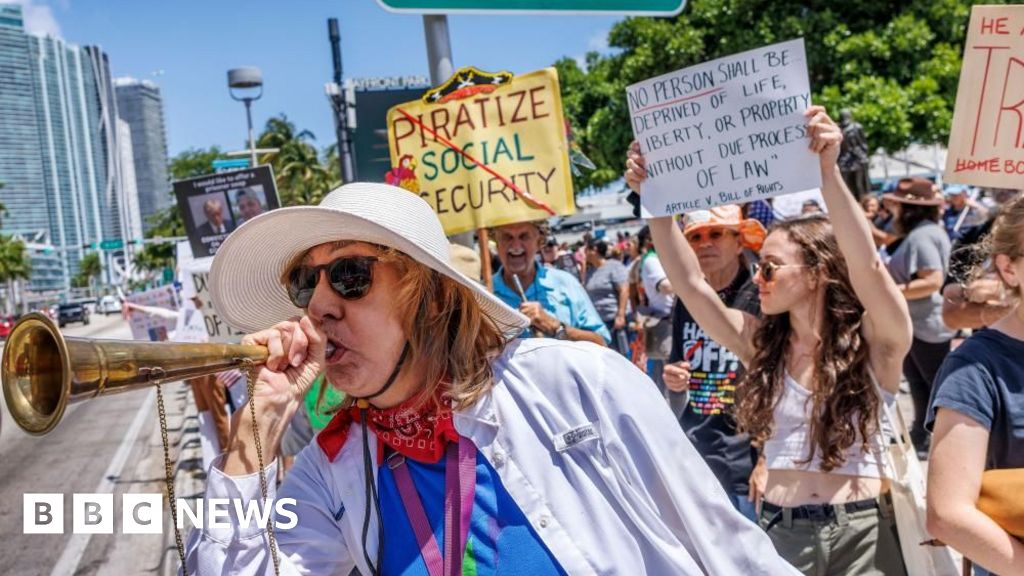ARTICLE AD BOX
Image source, Getty Images
One of Joe Biden's central election campaign themes was restoring unity to an angry and divided nation. Twelve months after assuming office, things aren't any better, writes Nick Bryant.
Long before the sun had risen over the dome of the US Capitol on the day that Joe Biden was sworn in as president, technicians on the inaugural platform tested the teleprompter he would later read from by scrolling through America's most celebrated sermon:
"Four score and seven years ago, our fathers brought forth on this continent, a new nation, conceived in liberty, and dedicated to the proposition that all men are created equal. Now we are engaged in a great civil war, testing whether that nation, or any nation so conceived and so dedicated, can long endure."
When I first saw the lines of the Gettysburg Address on those screens in front of the presidential podium, I thought it must be some kind of sick joke. However, the words of Abraham Lincoln could hardly be described as being out of place. Washington, after all, looked that morning like a military encampment.
Troops had slept overnight in the corridors of Congress to protect it from seditionists, just as their forebears had done in Lincoln's day. The scaffolding of the inaugural platform had been used only two weeks before as a staging post for the January 6th insurrection. The Confederate flag had even been held aloft in the halls of US power, as American once again fought American.
So the question posed by the country's 16th president seemed especially pertinent as the 46th occupant of the office prepared to assume power - could this country long endure?
Image source, Getty Images
Rather than speaking that day of national renewal, a platitudinous staple of presidential inaugurals, Joe Biden focused on national reunification. And though it was three words from his address that instantly entered the history books, "democracy has prevailed," it was three short sentences that set out his presidential mission statement: "Bringing America together. Uniting our people. And uniting our nation."
A year on, however, that plea for national unity sounds more like magical thinking. Far from coming together, the United States is in an even more perilous state of disunion. Often it feels as if the only thing that unites the nation is mutual loathing. America seems to be engaged in a forever war with itself.
Over the past 12 months, tensions have escalated over longstanding points of divergence, such as abortion rights. The country has found new things to argue about, such as vaccine mandates. It has also discovered new ways of fighting old battles. The conflict over critical race theory, the latest front in the country's left-right culture wars, is a novel way of carrying on the centuries-old debate over the legacy of slavery and segregation.
During the past year, moments with the potential to help bridge divides, namely the conviction of Derek Chauvin, the former police officer who murdered George Floyd, have been supplanted by events that ended up hardening divisions. The trial of Kyle Rittenhouse, the teenager acquitted of murder after shooting dead two men during racial unrest in Kenosha, Wisconsin, was an obvious case in point.
More on Biden presidency
To those who believed he should be convicted, Rittenhouse was a homicidal vigilante who recklessly waded into a racial protest carrying a military-style semi-automatic weapon. To his supporters, he was a patriot and American hero - one far-right website labelled him "Saint Kyle".
The teenager became the latest poster boy of polarisation. The debate surrounding his trial degenerated into a rage-filled ruckus of overlapping and interlocking arguments about gun control, self-defence laws, policing and double standards in the criminal justice system. As is now the norm in US society, policy questions involving complex and nuanced issues were thrashed out in the midst of a firestorm, often in the most binary and emotive terms.
Image source, Getty Images
Image caption,Two men argue outside Rittenhouse trial
On the Richter scale of American division, however, the Rittenhouse trial was only a moderate quake. The aftershocks of January 6th continue to be far more seismic. Rather than becoming a moment of Trumpian repudiation, the Capitol Hill insurrection ended up having a radicalising effect on the conservative movement. The so-called "big lie" that Trump won the election, a fringe conspiracy theory in the hours after Joe Biden was declared the victor, has since been adopted as mainstream Republican thinking.
What we are now witnessing is something without precedent in modern America - a former president, who continues to enjoy widespread backing from his party, refusing to accept the result of a clear-cut presidential election. Nor did the assault on democracy, its defenders would argue, end on the night of January 6th.
In the past year, Republican-controlled legislatures in more than a dozen states have passed restrictive voting laws. Laws have also been enacted making it easier to interfere in a partisan way with election administration, part of what Democrats claim is a a slow-motion coup to regain the White House at the next presidential election. Polling suggests, however, that more Republicans think that democracy is under attack than Democrats, another measure of disunity.
Free and fair elections, the very mechanism designed to peacefully resolve disputes in a civil society, are themselves now at the centre of a society-splitting dispute. And at the core of that row is something even more fundamental, the failure to agree even on incontrovertible facts - in this case the objective truth that Biden won. How can there be unity, in a country stewing in misinformation and conspiracy theories, when there is no longer a shared sense of reality? Truth is usually a prerequisite of reconciliation.
Image source, Getty Images
Some fear that January 6th was a foreshock, a prelude to an even more deadly eruption.
That explains the attention being paid to a series of recent books raising the spectre of further civil conflict and political unrest. In How Civil Wars Start: And How to Stop Them, the political science professor Barbara F Walter describes her country as an "anocracy", a mix between a democracy and an autocracy, and warns of further militia violence. In Divided We Fall, David French, an Iraq War veteran, fears states might even decide to secede from the union, the precipitant in the mid-19th Century of the American Civil War. The intellectual descendants of the plethora of books written since the turn of the century on US decline, they form part of a new genre - studies devoted to the prospect of American disintegration.
Few American scholars think the country is on the verge of a full-scale conflagration, a Civil War 2.0, in which compatriots would take up arms against each other on fields of battle that would become modern-day equivalents of Fort Sumter and Antietam. The more likely scenario, given the uptick in militia activity and the incendiary tone of political discourse, is of sporadic acts of political violence akin to the white supremacist rally in Charlottesville or the 1995 Oklahoma City bombing. Yet even this lesser possibility is alarming.
Late in the 2020 presidential campaign, Joe Biden actually travelled to Gettysburg to sound the alarm about the violent potentialities of division. "The country is in a dangerous place", he warned, speaking against the backdrop of a battlefield where tens of thousands of Americans ended up as casualties. "Once again, we are a house divided." Yet a president who cast himself as a consensus-builder, with bipartisanship in his bones, has not even managed to unite his party, still less his country.
Image source, Getty Images
As Biden is well aware, more battles loom on the near horizon. Sometime in 2022, the Supreme Court will deliver its highly anticipated ruling in Dobbs vs Jackson Women's Health Organisation, which could overturn the constitutional right to abortion and lead to an even more balkanised America. The mid-term congressional elections are another potential flashpoint. Even in the event of a conflict with Russia over Ukraine or a clash with China over Taiwan, it is hard to imagine a patriotic surge strong enough to bring the country together. On the contrary, much like the coronavirus pandemic and January 6th insurrection, a military confrontation would more likely expose the nation's fissures.
Read more from Nick
On inauguration day a year ago, you could almost hear the relief in Joe Biden's voice when he reassured his country, and the world, that democracy had prevailed. But in his two set-piece speeches of this new political year - one marking the anniversary of January 6th and the other delivered in Georgia demanding the passage of voting rights legislation - it was possible to detect both an air of resignation and a strident partisan tone. Both may well be an indication that he knows in his heart of hearts that his reunification project has failed, and that national healing is beyond him. Historians may one day view this as a personal failing. But I suspect many will be more sympathetic. After all, could any president heal a broken land that looks increasingly ungovernable?
Maybe the best that can be hoped for as the country approaches its 250th anniversary on July 4th, 2026, is for it to remain in a state of largely peaceful co-existence: that its cold civil war will never become hot. As for whether the country can long endure? It is still an open question.
Nick Bryant is the author of When America Stopped Being Great: A History of the Present. He now lives in Sydney

 3 years ago
95
3 years ago
95








 English (US) ·
English (US) ·